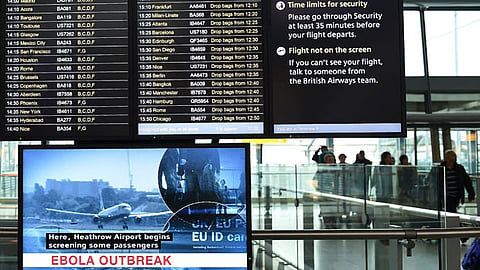Ebola death rate up to 70%: WHO
‘It could reach 5,000 to 10,000 cases per week by the first week of December’

Geneva: The death rate in the Ebola epidemic raging in West Africa has reached around 70 per cent, the World Health Organisation said on Tuesday.
“What we’re finding is 70 per cent mortality,” said Bruce Aylward, assistant director-general of the WHO.
The number of cases is continuing to spiral in the three hardest-hit countries, Liberia, Sierra Leone and Guinea.
“It could reach 5,000 to 10,000 cases per week by the first week of December,” Aylward said, though he underlined that that was just a working forecast to help guide the international fight against the virus.
“It’s been running at about a thousand cases a week now for about three to four weeks,” he told reporters in Geneva.
“The labs sometimes can’t keep up with the amount of specimens they’re getting,” he added, underling that the real case-count and death toll remained unclear as a result.
The latest case-count in the Ebola outbreak is 8,914, with a death toll of 4,447.
The overwhelming majority of the cases are still in Liberia, Sierra Leone and Guinea, Aylward said.
On paper, that suggests a survival rate of 50 per cent, but the figures mask the true picture, he underlined.
“There are this many cases that we’re aware of, this many deaths that have been reported to us, but that doesn’t mean you divide one by the other and get how many this disease kills,” Aylward said.
“To get that number, you need to take a bunch of people, follow them right through the course of their disease, and understand how many survive. That subset of people, who we know were sick, and we know their final outcome, what we’re finding is 70 per cent mortality, it’s almost the exact same number across the three countries,” he said.
“This is a high mortality disease in any circumstance, but especially in these places where it’s happening,” he added.
The international community has stepped up its anti-Ebola fight, with the UN Mission for Ebola Emergency Response (Unmeer) launching a strategy to try to rein in the disease.
Known as the “70-70-60” plan, it ensures that 70 per cent of burials are conducted safely and 70 per cent of suspected cases isolated, within 60 days.
“These targets could turn the tide of the disease,” Aylward said, adding that the international community was “pushing the system hard” to reach it.
Ebola spreads via the body fluids of patients, and can even be passed on by their corpses, meaning that there have been massive efforts to stem traditional funeral rights that involve touching a body.
Aylward noted that each Ebola patient infected around two other people, on average.
“Every time you isolate another patient, every time you have a safe burial, you’re taking some of the heat out if this outbreak,” said Aylward.
“But this is Ebola. This is a horrible, unforgiving disease. You’ve got to get to zero. And what gets you down to a level of control may not be — and usually isn’t — what’s going to get you down to zero,” he said.
“We’re going to have to really put the pressure on this virus to get it to zero,” he added.
Meanwhile, A Sudanese UN medical official who caught Ebola while working in Liberia has died in a German hospital where he was being treated, the clinic in Leipzig said on Tuesday.
The worst Ebola outbreak on record has killed more than 4,000 people — mostly in Liberia, Sierra Leone and Guinea — and has spread beyond West Africa, with a nurse in the United States and one in Spain having caught the disease from patients.
The UN medic, who has not been named, arrived in Leipzig last week and was the third Ebola patient to be treated in Germany. One was successfully treated and released from hospital, while another is still being treated.
“The patient sick with Ebola fever died during the night in St. Georg Clinic in Leipzig. Despite intensive medical measures and maximum efforts by the medical team, the 56-year-old UN employee succumbed to the serious infectious disease,” the German clinic said.
The volunteer medic was the second member of the UN mission, known as Unmil, to contract and succumb to the virus.
“Unmil colleagues are saddened by the tragic news as they continue to serve at this very difficult time. Our thoughts now are with the family and friends of the departed,” Unmil said.
Doctor Bernhard Ruf at the Leipzig clinic said, “we took measures of the highest standard to protect personnel and the environment, so there was no danger to others. We have also safely destroyed all material contaminated with Ebola.” The World Health Organisation said the number of Ebola cases in West Africa would exceed 9,000 this week and the epidemic was still spreading in the region.
Sign up for the Daily Briefing
Get the latest news and updates straight to your inbox
![Rachel Bloor kept her cool while guiding the snake out of the house. [Illustrative image]](http://media.assettype.com/gulfnews%2F2026-01-16%2Fmi5wlmq0%2Fpython.jpg?w=320&auto=format%2Ccompress&fit=max)


